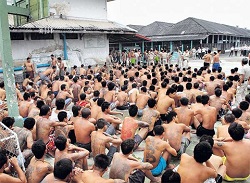The number of prison inmates in Argentina convicted for drug offenses has more than doubled in a decade, a red flag for the country’s growing role in the drug trade and the risk of future prison overcrowding.
The prison population sentenced on the basis of ‘Law 23.737’, Argentina’s anti-drug legislation, grew from 3,271 in 2002 to 6,979 in 2013, the equivalent of a 113 percent increase, reported Clarín. In comparison, Argentina’s global prison population has increased by 39 percent over the same period.
The data was revealed by the NGO Intercambios, which specializes in drug policy. Alejandro Corda, a lawyer and the NGO member who analyzed official data to arrive at the worrisome figure, pointed out that drug offenders now make up the third largest group of convicts, behind those sentenced for theft or attempted theft and those convicted of intentional homicide.
According to Corda, the main explanation resides in a 2005 legal reform dubbed “defederalization” which gave regional judicial and police branches jurisdiction over minor drug offenses, while drug trafficking remained a federal crime under federal jurisdiction. As a result, while the population of federal prisons grew by 28 percent, that of the Buenos Aires province prisons serving time for drug offenses exploded by 4,576 percent, from 8 prisoners in 2002 to 2,432 in 2013.
SEE ALSO: Coverage of Prisons
With minor offenders making up for a vast majority of prisoners convicted on drug-related charges, the lawyer argues that the 2005 legal reform has been mostly ineffective against organized crime. But he points out that the negative social impact of the policy is real, as most of these are uneducated youth lacking a strong family structure.
InSight Crime Analysis
While the impact of the 2005 defederalization reform in terms of increased prison population probably is not representative of an equally dramatic impact on drug trafficking in the country, the numbers seem to provide further evidence of Argentina’s growing role in the drug trade. The rise of insecurity, both real and perceived, has led President Mauricio Macri to adopt a hard stance against drugs during both his 2015 campaign and his current term in office.
SEE ALSO: Coverage of Security Policy
While a strong legal apparatus is crucial to any security and drug policy, the widespread and institutionalized targeting of low-level offenders can prove counterproductive. Not only does it consume considerable human and financial resources which could be aimed at bringing down key components of a criminal structure, but it also paves the way to an overcrowded, uncontrolled and crime-ridden penitentiary system.
Regional examples of countries having reached disastrous situations abound, from El Salvador’s gang-controlled prisons operating at 325 of installed capacity to Venezuela’s prison hostage situations. Argentina’s still has one of Latin America’s least overcrowded prison systems, with an occupancy rate of 103 percent. But the analysis presented by Intercambios indicates that the country may be moving toward the extreme prison overcrowding seen elsewhere in the region.

